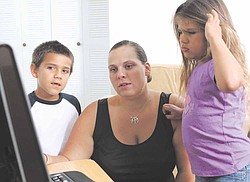Veterans battle unemployment
MCT
Air Force veteran Shannon Dotson shows photos of her service time to her son, Nicolae, left, and her daughter, Anastasia, at their home in Sanford, Florida, on May 12, 2011. Since getting out of the service Dotson has worked several temporary jobs while looking for full-time employment. (Joshua C. Cruey/Orlando Sentinel/MCT)
Soldiers returning from war struggle to find jobs
By Richard Burnett
Orlando Sentinel
ORLANDO, Fla.
Kyle Evans just missed certain death when a bomb exploded under his military-convoy vehicle in Iraq. The Army logistics expert survived and returned home to Orlando nearly two years ago, though for the longest time he could not find work.
“I applied for so many jobs, I lost count,” said the 28-year-old husband and father of two, who finally landed a job this year at the U.S. Department of Veterans Affairs clinic in Orlando.
“It was getting pretty frustrating. This job market can be tough on anyone, but it can be twice as hard on veterans.”
Amid the violence of combat, many veterans of the wars in Iraq and Afghanistan never imagined the added stress they would face in trying to find work back home, experts say.
Unemployment among these recent veterans is higher than among the rest of the population and among military veterans overall, according to the latest U.S. Labor Department data. In April, as the country continued its slow recovery from the worst recession since the 1930s, the jobless rate among Iraq and Afghanistan vets was nearly 11 percent, compared with 8.5 percent for nonveterans and 7.7 percent for veterans overall.
“There is a disconnect with the private sector. Vets are finding it more difficult than ever to translate their military experience into a civilian career,” retired Navy Rear Admiral T.L. McCreary, now president of the career-service website Military.com, said in congressional testimony last month.
The gap between recent veterans and the rest of the country’s labor pool could widen later this year if the U.S. military, as scheduled, pulls its remaining troops out of Iraq and begins its “drawdown” of personnel in Afghanistan.
And though the government’s employment reports show job creation picking up steam generally, jobs locally and nationwide are harder to come by these days at defense contractors, historically big employers of veterans, military officials say.
“From what we’ve seen, hiring by defense companies has been really limited because of the (federal) budget crunch,” said Capt. Todd Hopkins, senior operations officer for the Army’s National Guard office in Orlando. “That’s a concern, since they have always shown strong support for hiring veterans in the past.”
If returning veterans can find business owners with military experience, it increases their chances of being hired, said Jim Jardon, a Vietnam War vet and chief executive officer of Jardon & Howard Technologies Inc., an Orlando-based defense company that has hired a number of recent veterans.
“It is very hard to explain to people who have not served in the military, but there’s a very strong bond that veterans have with other veterans,” he said. “As an employer, you understand what they have been through, and you feel that, even if they have a little baggage, they deserve a shot.”
Still, unemployed veterans of Iraq or Afghanistan — 214,000 of them as of last month, according to government figures — have found it tough to land full-time work in the defense industry or any other.
Shannon Dodson, 33, of Sanford, Fla., is one of them. Dodson, an Air Force logistics traffic manager and mother of three, said civilian employers don’t “get” her qualifications as a manager of mission logistics.
She has worked temporary jobs at convenience stores and for the U.S. Postal Service to make ends meet. Now she is a single mother going through a divorce, further complicating her job search.
“I think it is especially tough on female veterans,” she said. “I’ve been to war and back multiple times. I’ve managed logistics for missions in Afghanistan, Pakistan, Saudi Arabia; you name it, I’ve been there. Now I have three children and no job. And I’m hurting pretty bad right now. But I know there are a lot of people out there who have it worse. So my heart goes out to them.”
 43
43

